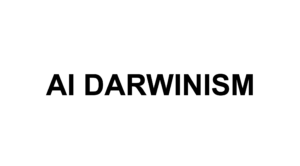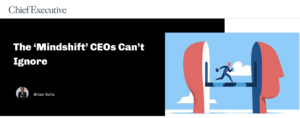Solis is listed as a key contributor on The Digital Transformation People’s News In Digital under the heading of Strategy & Innovation. The pull quote from his linked article “A Prelude To Innovation” is “If innovation is the key to future-proofing and more effectively competing for the future, why is it that many organizations get caught up in a pattern of incrementalism?”
The article itself appears on the Singular University Website. It’s subhead is: Ideas are Denied by the Dozen: Why We Need to Celebrate Ideas, Ideation and Innovation to Succeed. Solis’ foundational questions is: If innovation is the key to future-proofing and more effectively competing for the future, why is it that many organizations get caught up in a pattern of incrementalism?
His assessment: “It comes down to organizational culture—and what it fosters and rewards vs. what it limits, stagnates, and censures. This can lull teams into complacency and even fool them into thinking they’re actually innovating when in fact they’re iterating, making strides based on past performance, rather than cultivating new opportunities. The differences between iteration and innovation are key to the survival and promise of every company. You need a balance of both.”
He offers three key concepts: Iteration is aiming to endeavor in new efforts that essentially scale or make the same things better. Innovation is doing new things that deliver new value and/or inspire new behaviors and standards. Disruption results when new value supersedes previous value, making old services obsolete.
Key quotes:
“Without changing the standards, without normalizing and empowering risk-taking and incentivizing curiosity and creativity, we cannot open new doors. Without giving ourselves or those around us the permission or freedom to move in bold, new directions, the designated sandbox for innovation does nothing to reshape or re-imagine an uncharted future. Instead, the schematics and the cultural dynamics of the box directly shape the results produced within it. They become the box—and we never left, even though we convinced ourselves we were thinking outside of it. This is the result of leadership-induced “groupthink.” It fosters corporate citizens to operate (cower) to the known knowns as guidance, guardrails, and governance. As such, they are not incentivized to challenge their own status quo or unlock a fresh or unique perspective to deliver a personal and original approach that explores and surfaces new value. Instead, it places a great deal of pressure on organizations to grow based on current trajectories. Ideas are a gateway to new possibilities, and undermining them is a doorway to insignificance.”
“When it comes to ideation, collaboration, and inspiration, you are either part of the solution or part of the problem. It’s not just those who do not pursue their ideas that affect progress. It’s also those who don’t recognize the promise in others or emergent trends that are gathering momentum outside their lane or market. These scouts and soothsayers are instrumental in identifying threats and opportunities to help companies of all sizes and in all industries, prepare, react, and innovate to compete or disrupt moving forward. But like budding innovators and entrepreneurs, they too are often underappreciated in or by organizations that overly focus on scale, momentum, and optimizing the status quo. Thus fear, self-doubt, and lack of support prematurely silence or quash the very dreams of the dreamers who can help stave off disruption and create new opportunities.”
Read the Digital Information Article here: https://www.thedigitaltransformationpeople.com/channels/the-case-for-digital-transformation/news-in-digital-from-the-digital-transformation-people-36/
Read Solis’ “A Prelude To Innovation” Article here: https://su.org/blog/why-we-need-to-celebrate-ideas-ideation-and-innovation-to-succeed/?






Leave a Reply